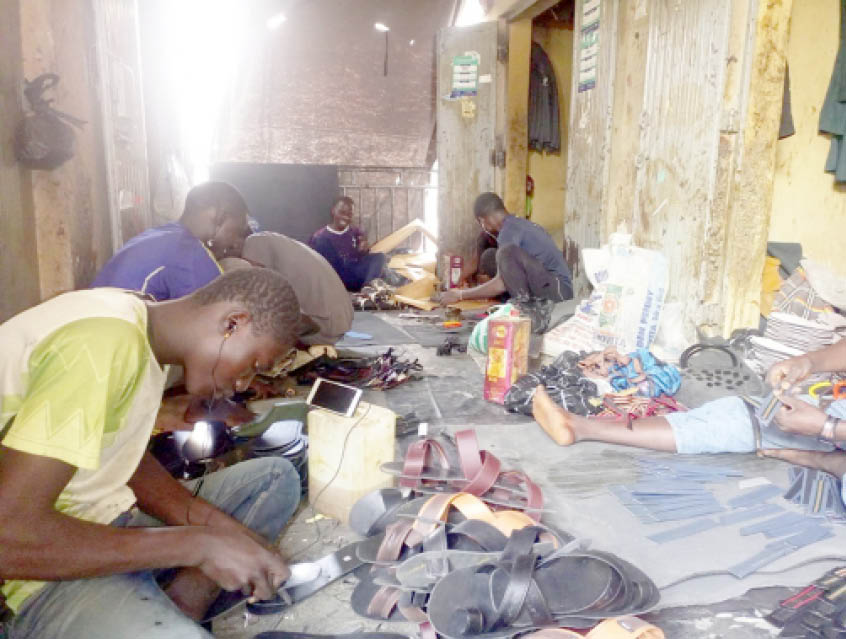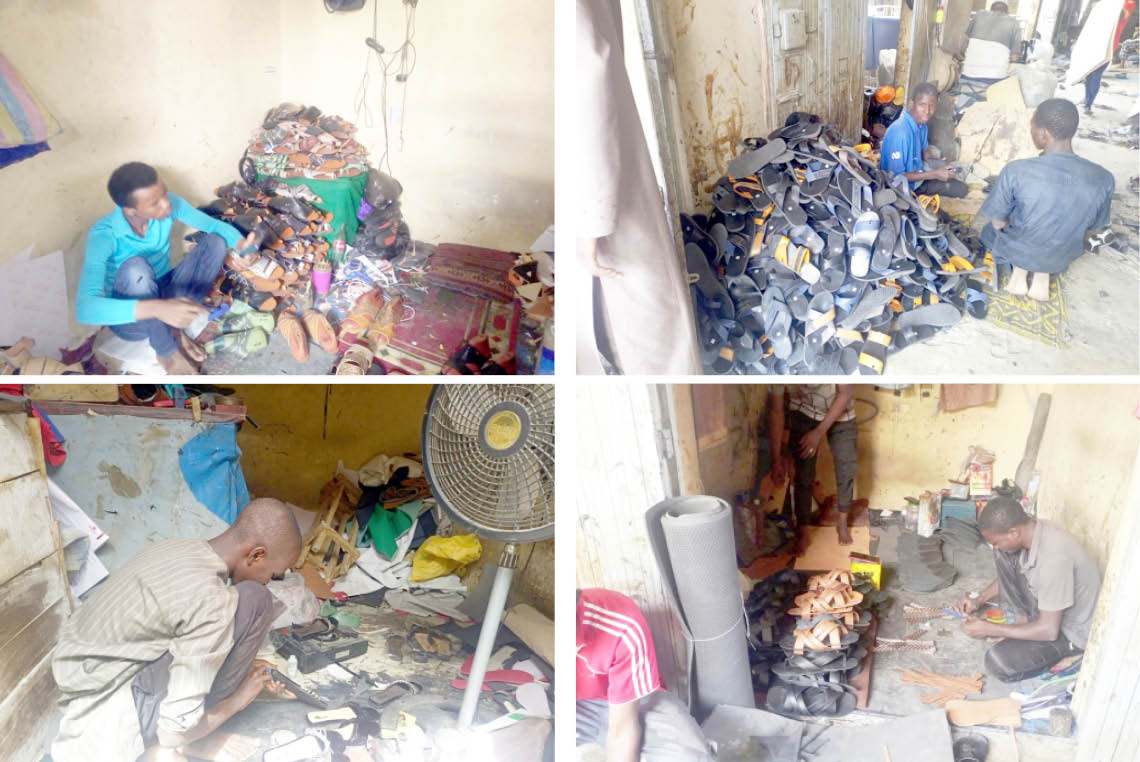Despite odds, Kofar Wambai shoemaking hub struggles to remain afloat
History has proven that shoemaking was at a time synonymous with Kano State. It is one of the practices that gave the state a unique feature, making it a centre of commerce. Daily Trust Saturday takes a look at the challenges affeting the shoemaking hub. No doubt, the business of shoemaking in not only […]

Activities at Kofar Wambai shoe making in Kano
History has proven that shoemaking was at a time synonymous with Kano State. It is one of the practices that gave the state a unique feature, making it a centre of commerce. Daily Trust Saturday takes a look at the challenges affeting the shoemaking hub.
No doubt, the business of shoemaking in not only Kano State but the entire country is gradually becoming lucrative. Interestingly, made in Nigeria shoes are slowly getting recognition internally as Nigerians have begun to show keen interest in locally produced shoes, and as such, increase in patronage has given hope to local made industry. However, this is not without huddles and issues the industry has been trying to overcome.
For decades, the Kofar Wambai shoemaking hub has been one of the historic business centres in the ancient city of Kano. It is a place where the young and old practice the art of shoemaking locally.
According to a 75-year-old Malam Shu’ibu Tanko Gwale, shoemaking in Kano has been dated back to time immemorial. He said settlements like Dukawa and Kofar Wambai quarters in Kano metropolis had been known for shoemaking.
Army chief to media: Don’t provide bandits, terrorists oxygen to thrive
There’ll be no middlemen in students’ loan – Gbajabiamila
He explained that the art of shoemaking started with shoes for royalties and later moved to mass production for the general public.
“We grew up with shoemaking. In fact, it was believed that there was no household in Dukawa and Kofar Wambai that did not engage in the production of shoes or other accessories made from leather in one way or another.
“We produce various high quality leather shoes, ranging from styles for royalty, sandals for men and women, and different styles of cover shoes of different leather designs and quality,” he said.
Shu’aibu, however, said that unfortunately, shoemaking business in Kofar Wambai was gradually becoming a shadow of its former status. He lamented the high cost of raw materials, lack of capital and low patronage as some of the impediments against the prospect of the business.

He said, “We have the ability and skill to produce all sorts of shoes that can compete with foreign products. I don’t want to brag, but I am confident that shoes made in Kofar Wambai should be given the chance to compete on the global shelf.”
It was reliably gathered that some business people used to purchase made in Kofar Wambai shoes in bulk and export to Asia and later import it back to Nigeria as either made in Dubai or Saudi after making some retouches.
The Kofar Wambai shoe hub is known for slippers, cover shoes and sandals of various styles and colours.
The locally produced shoes, Ogbede said, had an advantage over foreign ones.
“We use the same quality of materials they use in Italy and Spain. In fact, there is even no way of distinguishing between our products and the ones that come from abroad, in terms of design and quality.
“The advantage we have over them is that we understand the terrain better, so we adapt our products to local conditions. For instance, the soles they use in Italy cannot survive our rainy environment, but ours do,” he said, adding that he gives at least a one-year guarantee on his shoes.
One of the shoemakers, Malam Usman Yahaya, said he inherited the art from his uncle and had grown in the business to become an entrepreneur, who had trained many youths.
He also disclosed that the shoemaking business had transited through various development stages. And currently, it is being controlled by the youth, who are very innovative and in tune with the shoemaking development trend.
Yahaya also said practitioners had grown to become a force to reckon with in the shoemaking business, to the extent of effectively managing it despite all odds.
“Initially, people thought that Kofar Wambai shoes had been wiped out of circulation and the business was as good as dead. But with efforts from the youth who have taken over from their elders, the business was resuscitated. Today, we have restored the lost confidence in our products, and people have been patronising our shoes with confidence.
“However, it wasn’t as easy as people thought, the road has been very rough and the trend competitive,” he revealed.
Another shoemaker said the youth who took over the business were very enterprising and innovative; hence they have transformed the business to a sustainable level. He added that they had brought into the business some forms of modern approach.
“But in spite of the challenges our local shoes have faced, the youth in the business were not daunted. Our people are very hardworking, they are fully occupied and more educated. They have been producing shoes as was the practice by our forefathers in a different format that includes the use of new techniques. And we are ready to continue with it in spite of the challenges,” he said.
However, for Isma’ila Abdullahi Hassan, the Kofar Wambai shoemaking hub has been an avenue that has provided employment opportunities to hundreds of able youths that are currently in control of the business.
He added that many of the youths operating the business had been sponsoring themselves to further their education, as well as to be self-reliant.
Malam Usman Kabir Khalid, the secretary of the Kofar Wambai Shoemakers Association, said they needed government’s attention to keep developing the business, as well as enable them compete favourably with other shoemakers from other countries.
He said the shoemaking hub should be upgraded to a modern micro industry in terms of the provision of modern technologies and affordable raw materials.
